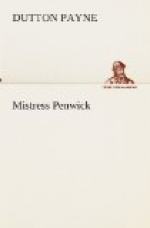“Thou dost indeed stir me to great interest, Lady Constance; he must be a wonderful man. It seems we seldom have so many great qualities in one human being. He must be quite along in years?”
“Nay, not at all! His very youthfulness is what makes him such a wonder. If I remember rightly, he is but two years senior of Cedric, and I will venture there is not ten pounds’ difference in their weight. They are very much the same mould, and their voices blend as one, but Cedric has the handsomer face. Sir Julian, however, has a countenance of no common order; ’tis like a rock of strength already well lined and marked by the passions that have swayed him to battle and death or—perchance a lover’s intrigue. He is in great repute for his smile that is transcendent in its beauty, but one can never tell what note it rings, whether true or false; its condiment may be of malice, hate, reserve, flippancy, deception. And one looks on and fears to take part in his mirth, for the reason one knows not what lies beneath in Sir Julian’s heart.”
“Indeed, and he is to arrive soon?—Sir Julian Pomphrey—I like the name!”
“It is one of the best names in England. I shall be very glad to see him, and hope he will come soon. When he gets word his Grace is so ill, he will probably come as fast as the ship and post-horses can travel. He is at present a special emissary to France. He did write Cedric some time since that he was about to return to England, that his work there was nearly finished.”
“He will doubtless be playing fine French airs, and have much gossip of the composers and will perchance bring music with him that will stir us to greater study of execution.”
“It may be, and it mayhap so move thee; but I am foreign from the rudiments of counterpoint and technique and such lollipops of harmony.”
“Then it must be wearisome to hear me prate of the divine art, and much more to hear my poor drummings on the harpsichord, I am sorry—”
“Nay, be not so. I am more content when thou art at practice than at all other time, save when I am with thee thus, alone.” And there was a covert meaning in her flattery. “Now, my dear Katherine, if thou art thus beset on the morrow, I will engage to come at thy retiring hour and dress thy hair; ’twill give me such pleasure.”
As Lady Constance retired from the chamber, Mistress Penwick stretched her lithe body and yawned and expressed a desire for the bed. Soon she was left alone, and she stole from her couch and knelt at the hearthstone and read the missive eagerly and flushed not a little at Count Cantemir’s warm words of love that were a prelude to the weightier matters appertaining. She crept back noiselessly and lay pondering of many things. It seemed to her as if all earth breathed of love; that she was the nucleus around which all flowers and perfume and everything beautiful revolved. And now she was about to open a mystic shrine, into which she would step and see and know and feel with youth’s ecstasy a strange development of essential existence. And after wondering and speculating upon the affairs of love, she entered into prayerful thought of Lord Cedric’s servant, and soon fell into sound slumber.




